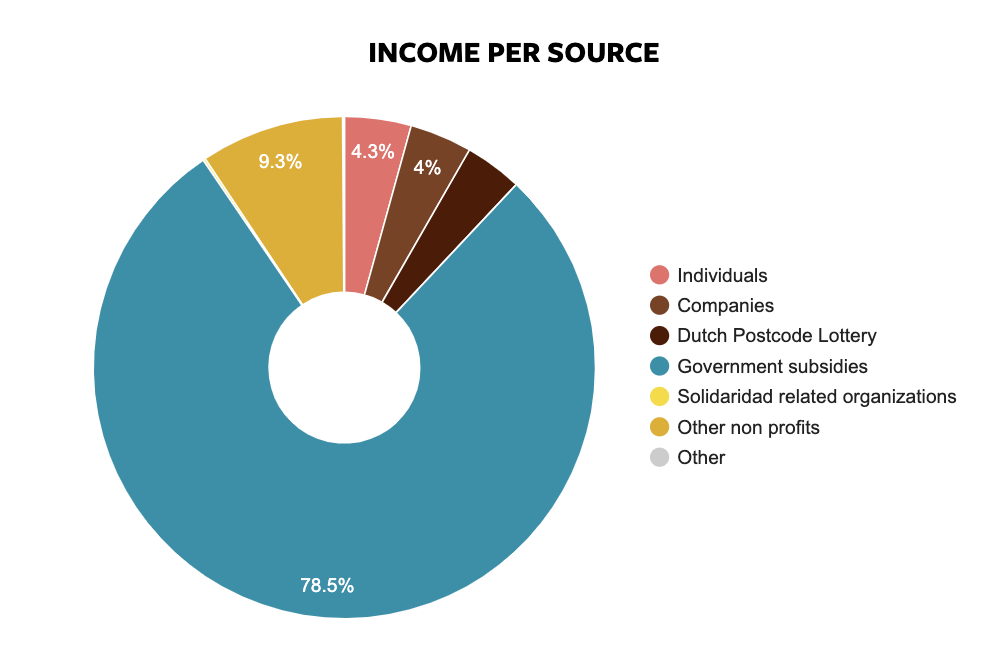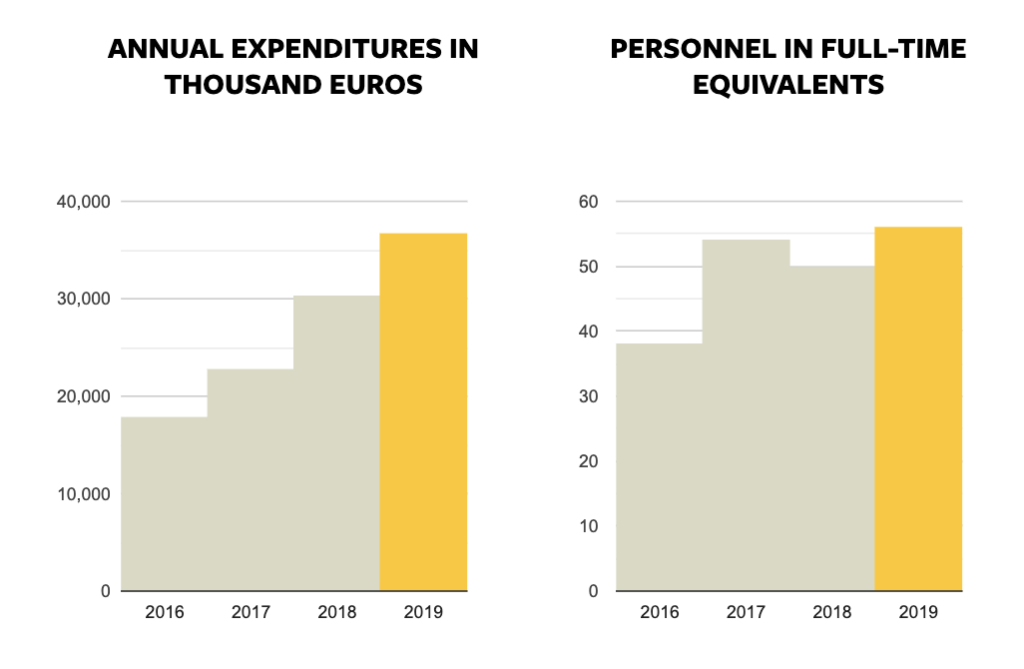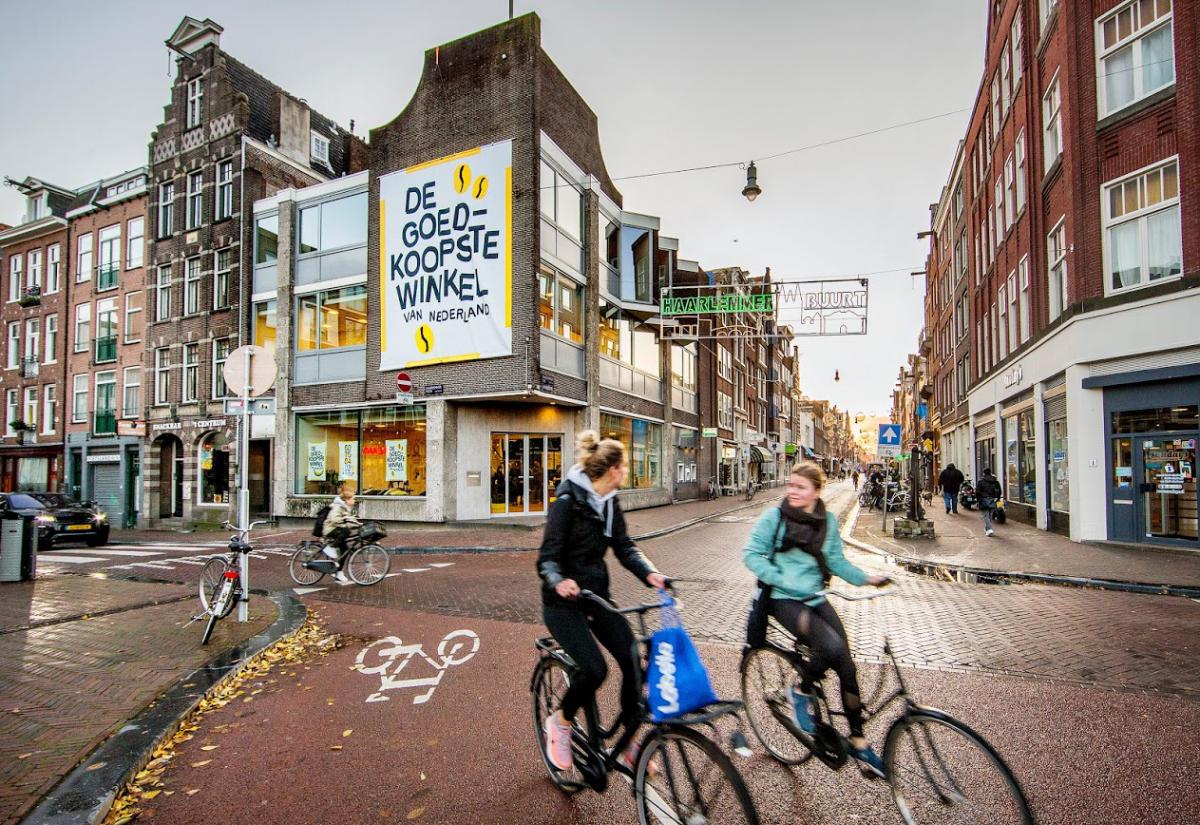Our anti-Black Friday campaign, centered on this pop-up shop in Amsterdam, raised awareness of the low prices farmers receive for their produce
THE IMPORTANCE OF A LIVING INCOME
There was growing awareness of the importance of sustainable livelihoods for farmers, miners, and other workers. Public and private stakeholders increasingly recognized that rural poverty is the root cause of multiple problems. In response, companies began committing to the goal of a living income. Although they did not yet agree to a timeline, Solidaridad was pleased the issue received more attention.
Criticism spread of voluntary certification schemes and agreements with sourcing countries and how they impact sustainability issues. To make sustainability the norm, Solidaridad calls for mandatory regulatory frameworks and we actively supported the development of these frameworks.
SOLIDARIDAD IS A THOUGHT LEADER
Thanks to broad recognition among stakeholders of our thought leadership in this area, we were able to advise on how to formulate the policies and regulations to optimal effect. As a result, stakeholders in the cocoa industry urged the European Union to issue legislation increasing due diligence for cocoa and other commodities.
Blended finance mechanisms were another hot topic in Europe this year. However, we continued to see a strong aversion to risk, limiting investments in agriculture in developing countries. Traditional banks struggled to scale up their investments in the sector. That’s why Solidaridad readied the launch of PlusPlus, a new crowdsourcing platform to support farmers and food entrepreneurs in developing countries with loans from private individuals in the Netherlands.
STRENGTHENED CORPORATE PARTNERSHIPS
In the corporate sector, the sustainability focus shifted to climate-related issues, biodiversity and plastics. Impact measurement was also spotlighted. The risk of greenwashing remained, with some market actors making big public statements, but then finding it difficult to execute on these and having to accept the financial consequences.
Solidaridad nevertheless succeeded in building new and deeper relationships with our corporate partners. We were active in a wide range of industries, including palm oil, sugarcane, and leather processing.
ADVOCACY
Solidaridad Europe substantially exceeded the expected results of our advocacy work in 2019. Our efforts contributed directly to the improvement of policies and regulations leading to more sustainable and inclusive supply chains. For example, the approval of the Roundtable for Sustainable Palm Oil’s Simplified Smallholder Standard means lower certification costs for farmers and ameliorated access to benefits. This improved policy marks an important step in the struggle to prevent marginalization of smallholder farmers in the supply chain.
Other key achievements are the 16 policy recommendations that Solidaridad (co-)developed, including:
- recommendations for the European Union deforestation roadmap
- Fairtrade’s revision of its Gold Standard
- building blocks for a sustainable circular economy for textiles and footwear for the European Commission
- recommendations for improvements to the Jewelry Code of Practice.
As a result of the ongoing advocacy efforts in a number of multi-stakeholder platforms like the Textiles Covenant, fully 66 companies began implementing more sustainable sourcing or production.
We developed and maintained a considerable number of corporate relationships: 30 supply chain partnerships, 11 innovation partnerships and three strategic partnerships. While building and strengthening these went well, collecting the pledged funds lagged behind.
DONOR RELATIONS
Solidaridad’s biggest donor, at both the European and the global network level, continued to be the Dutch Ministry of Foreign Affairs. We supported our strategic partnership with the ministry in the Netherlands and with Dutch embassies in many of our implementation countries through regular strategic dialogue sessions, policy exchange, and knowledge sharing.
Solidaridad also worked with the governments of Germany, Denmark, Norway, UK, Switzerland and the European Union, mainly through their Departments of Foreign Affairs.Income from government donors was substantially higher than budgeted – almost 29 million euros versus 24 million – due to new contracts with donors like the Norwegian Agency for Development Cooperation and the European Union.
Income of 37 million euros
We comfortably met our target end-of-year income with 2019 actuals of 37 million euros. This was thanks to our growth strategy aimed at diversifying our donor base and strengthening existing partnerships. We scoped new donors such as the European Union and new European government aid agencies.
This year, we paved the way for new business models such as service contracts and provided more targeted support to Solidaridad Regional Expertise Centres around the world to improve their local fundraising capacity. We strengthened further our strategic partnership with the Dutch Ministry of Foreign Affairs, preparing for an extension beyond 2020.
Strong partnerships to maximize impact
Meanwhile, we continued to strengthen our current partnerships and deliver on existing contracts and commitments. In this way, we aimed to secure continued support from our partners, leading to maximum impact. For instance, our relationship with the Dutch Postcode Lottery remained strong: we received an un-earmarked contribution of 1.35 million euros in 2019.
It was encouraging that donors granted 75% of the full proposals we submitted. Donations within the Netherlands grew and we also received substantial legacies enabling us to improve the livelihoods of farmers and workers in a number of countries.
INCOME PER SOURCE

POLICY INFLUENCING
The increased mainstreaming of sustainability means governments play a vital role as drivers of change. Their support is an important precondition to promoting inclusive sector transformation and making sustainability the norm.
In 2019, we actively supported the development of regulatory frameworks, and advised on governments and private sector policies alike to build more sustainable and inclusive supply chains. Solidaridad and the VOICE Network issued a joint call to the European Union for legislation to ensure living incomes in cocoa and other commodities with Barry Callebaut, Mars Wrigley, Mondelēz International, Rainforest Alliance and Fairtrade.
New standard for palm oil smallholders
The Roundtable for Sustainable Palm Oil General Assembly approved the Simplified Smallholder Standard. This standard means lower certification costs for farmers and ameliorated access to RSPO benefits. This improved policy was an important step in preventing the marginalization of smallholder farmers in the palm oil supply chain.
Through the Women’s Rights and Mining workgroup, Solidaridad made recommendations to the Extractive Industries Transparency Initiative (EITI). These sought to improve the global standard of promoting the open and accountable management of extractive resources.
Based on these recommendations, the EITI Standard now explicitly includes the rights of women in mining. This is a significant improvement to the policies, and to progress from gender transparency to accountability for the 53 implementing countries.
Greater impact in cocoa
After many years of collaboration with the VOICE Network to develop our Cocoa Barometer overviews of the sector, Solidaridad became a full partner of the network in 2019, with the aim to further boost global advocacy for a sustainable cocoa sector.
Joint advocacy efforts with the VOICE focused on the position of smallholder cocoa farmers and the role of national governments. This contributed to the establishment of a living income price differential by the governments of Ghana and Côte d’Ivoire. Companies and industry organizations said they would pay the differential. Additionally, Rainforest Alliance/UTZ announced a mandatory cash premium to be implemented in the near future.
CORPORATE PARTNERSHIPS
In 2019, we strengthened our three corporate strategic partnerships – with Henkel, Syngenta and Stahl. For instance, an innovative portfolio of seven field programmes developed with German chemical and consumer goods company Henkel supported more sustainable and inclusive palm oil production and trade. Joint strategic communication aimed to increase the uptake of sustainable palm oil.
We worked with agro-input company Syngenta to ensure smallholder farmers had access to better input products and services. In 2019, we discussed future strategies to strengthen the collaboration, focussing on sustainable soil management, crop protection and seeds.
With the ambition of playing a leading role in promoting sustainability in the leather sector, global chemicals supplier Stahl was another strategic partner. Three new initiatives were started in 2019, and the portfolio comprised projects in India, Ethiopia and Bangladesh.
Additional initiatives from coffee to textiles
Solidaridad implemented multiple initiatives with other corporate partners in 2019. These included a circular coffee project in Peru with Jacobs Douwe Egbert and Olam, and a new project with Coca Cola, Cutrale, Eckes-Granini and Innocent Drinks to support citrus smallholder farmers in Brazil with adopting sustainable farm management.
ASN Bank funded a pilot project with training services provider QuizRR to improve labour conditions and wage management in textile factories in China. Apparel brands H&M, ESPRIT and Kappahl nominated factories in their supply chain to participate.
New innovation partners in 2019
We also established no less than five new innovation partnerships this year, with:
- Precious metals group Aunexum to develop low-tech mercury-free small-scale gold mining
- Impact Facility to create an impact investment fund for artisanal and small scale gold miners in Africa
- Seed developers East West Seeds to improve farmer incomes and combat malnutrition
- Raízen, Brazil’s leading sugarcane ethanol producer, and the Dutch branch of electric utility RWE to develop a sustainable bagasse pellet supply chain in Brazil
- The newly established joint venture PlusPlus with Lendahand, ICCO and Truvalu, aimed at offering loans to medium-sized farmers and food entrepreneurs in Asia, Africa and Latin America.
The role of IT in palm oil and sugar
We built a new strategic research partnership with Tilburg University’s Data Science department. The palm oil and sugarcane sectors and the use of information technology for sustainable development generally are focal areas of this partnership.
KNOWLEDGE MANAGEMENT AND LEARNING
Our Knowledge Management and Learning team provided planning, monitoring and evaluation advice for the development of ten new proposals. It developed and implemented 13 learning and research cases, six approaches for gender projects, sustainable landscape initiatives, as well as projects around palm oil, gold, corporate engagement and policy influencing.
The team crafted guidelines, tools, processes, and training materials for these. It also created a learning policy for Solidaridad Europe, and supported the development and implementation of various training courses.
COMMUNICATION AND CAMPAIGNING
The Golden Line photo exhibition about female gold miners was a key campaign in 2019
Communication in general, and campaigns in particular, played an important role in creating and growing the demand for sustainable products, donor support and visibility. Solidaridad Europe had a potential audience of more than 200 million people for unpaid publicity in 2019, mostly through online media channels. This played a huge role in increasing brand awareness.
We celebrated our 50th anniversary with our corporate partners, institutional donors and other (civil society) partners in May, and held a special event for our Dutch private donors in December.
Demanding a better deal for farmers
Our anti-Black Friday campaign contributed significantly to the visibility of Solidaridad in the Netherlands. The campaign’s key message about unfair value distribution captured the zeitgeist. It had over 24 million potential viewers, and an advertising value equivalency of 180,000 euros (exclusive of TV and radio).
Plight of miners in the spotlight
Solidaridad Europe was present at the 15th annual general meeting of the Intergovernmental Forum on Mining, Minerals, Metals and Sustainable Development, and at the OECD meeting on Responsible Minerals.
We drew special attention at both events to the position of women in artisanal and small scale mining. At the OECD meeting, we underscored our message by launching our photo exhibition of women working in small-scale mining, funded through the Golden Line programme.
Media attention around palm oil
We received extensive media coverage around the launch of a palm oil-free margarine onto the Dutch market by a company called Flower Farm. When the company spread misleading information about palm oil, Solidaridad supported a complaint to the Dutch Advertising Code Authority by the national trade organization for oils and fats. Following the verdict, Flower Farm had to change its branding and advertising.
Our own online media also achieved higher visibility, including a 27% increase in new website users, 83% increase in page views, 25% increase in website visits, and over 4,000 new followers on Linkedin. The number of subscribers to our global newsletter skyrocketed – from 7,800 to 47,000.
FINANCE AND CONTROL
Solidaridad Europe had a robust financial year with positive results in 2019. We considerably grew and diversified our income from donors. We are proud to be able to report we have spent 98% of the total expenditures directly on our objectives.
Through the creation of an internal innovation facility, Solidaridad colleagues were encouraged to generate ideas to enhance return on investment as well as social and environmental impact. The exercise was received positively, and led to an allocation of the 2019 results to an innovation reserve; this will allow for expansion and financing of innovation projects in 2020. The rest of the positive result has been added to Solidaridad’s continuity reserve.
The audited annual financial reports for Solidaridad Europe and Solidaridad Nederland can be found below:
ANNUAL EXPENDITURES IN THOUSAND EUROS



